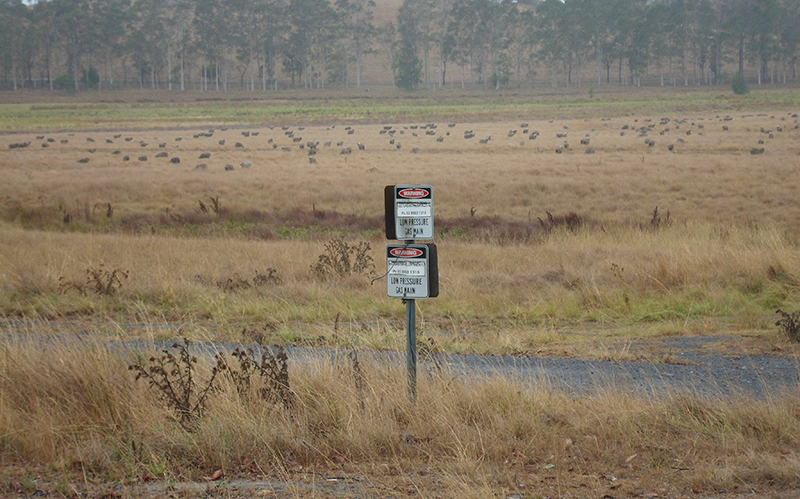Social licence and unconventional gas: a solution to, or component of, conflict?
Federal government efforts to generate a significant increase in natural gas production have generated considerable backlash. This is keenly felt in the locations where industry extracts the gas from on-shore resources. A common expectation is that oil and gas companies will not only have legal permission to operate but will also have social permission – ‘a social licence to operate’. Defining and clarifying just what is meant by a ‘social licence’ is the subject of extensive research, including by consultants and organisations like the CSIRO.

New research, led by Professor Fiona Haines from the University of Melbourne and Professors Sara Bice and Helen Sullivan from the Australian National University, suggests that defining a social licence to operate will remain challenging. This is because the social licence itself is drawn into, and intensified by, the conflict over resource exploitation.
Conflicting claims over the awarding of a social licence are common. In one of the most contested sites, Narrabri in New South Wales, the local council stated that Santos had earned their social licence. However, Independent MP Justin Field argued precisely the opposite.
These conflicting views pose significant challenges for energy companies that promote the importance of the social licence. AGL, for example, states that it puts the social licence at the heart of what they do, namely, “… meeting and exceeding community expectations.” The nascent hydrogen industry has also highlighted the importance of a social licence.
Exploring a social licence in Australia’s Coal Seam Gas industry
The research involved an in-depth exploration of what a social licence meant to those communities, companies and regulators directly affected by and involved in Australia’s coal seam gas (CSG) operations. It found that debates over the meaning, purpose and value of a social licence were all shaped by the conflict over gas operations.
Disagreement over the meaning of social licence split three ways.
First, for many, social licence symbolised reciprocity and mutual respect between a proponent and community.
For others, the social licence was a stamp of approval based on limited evidence. These respondents were adamant that social licence was not meant for communities at all, but as a means for companies to claim reputation and take actions unwanted by locals. Those opposed to the gas project would turn this claim around arguing projects had ‘no social licence’.
A third group felt social licence was largely a distraction; an unhelpful buzzword that clouded rather than clarified the issues at hand.
Across each of these disparate groups, the value of a social licence followed its meaning. When the social licence represented reciprocity and mutual respect, it was considered essential. Where it was described as a rubberstamp of approval, it was seen as a Trojan horse; a strategy to convince the broader public or the government that a project was essential. Across these groups, those supportive of or opposing CSG development could both embrace a social licence or be wary of the term.
Who gets a say?
The very definition of ‘community’ was central to a social licence. Perceptions of who belonged (or not) to a community reflected and exacerbated conflict. The individuals and families who comprised an ‘affected community’ seldom aligned with those defined in law or by geographical boundaries. Issues of identity loomed large – who had the greatest claim to belonging to a community and what kind of future was best for the area were common sources of tension.
A question of democracy
Questions of authority further heightened disputes over who belonged to a community. Indeed, questions of who could legitimately exert their authority in granting or withholding a social licence connected the social licence to the nature of democracy itself.
The research found concerns about the relationship between democratic practice and a social licence were most striking when the social licence was compared with the legality of a project. Some maintained the social licence was ‘undemocratic’ since the law itself was a result of democratic elections where each had the right to vote. The social licence in contrast, they argued, could be manipulated by the few at the expense of the many. If legal permission was granted to a project then social permission necessarily followed.
Others argued that the social licence was an essential component to democracy because it allowed local communities a say in what happened in their midst. For these individuals, democracy was broader than a legal permit to exploit the gas. It was the right to a voice, the right to be heard and the right to be respected.
Social licence: the need to focus on substance rather than terminology
Overall, the research re-emphasised the importance of a social licence when used to draw attention to and support communities’ rights. A social licence can help open up discussions between a proponent and a community. It can lay down ground rules and expectations that affected communities can appeal to when concerns arise. It can emphasise the necessity of continuing dialogue to ensure companies hold up their end of the bargain. It can also broaden a conversation to include new people or a different audience or new issues as conditions change.
To reach these objectives, though, the research also finds the social licence must include robust, inclusive conversations within communities to address key questions and concerns. Without this, the term becomes part of the conflict and a source of division.
Where the term ‘social licence’ hinders a respectful and meaningful dialogue both within communities and between communities and proponents the research advises communities to focus on substance rather than terminology. Addressing concerns, keeping the focus on how communities can thrive now and in the future, is of primary importance.
If you want to learn more about this research, Professors Fiona Haines, Sara Bice and Helen Sullivan welcome your questions.
You can also register for our upcoming webinar, The Social Licence – a pathway or stumbling block to meeting Australia’s Energy needs? to learn more.